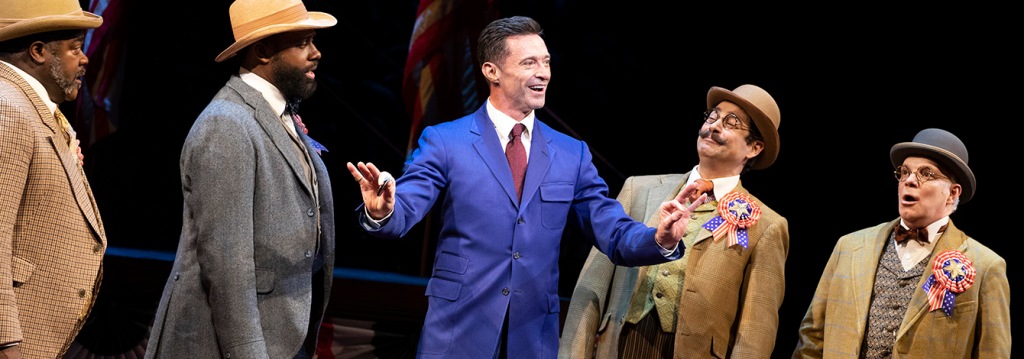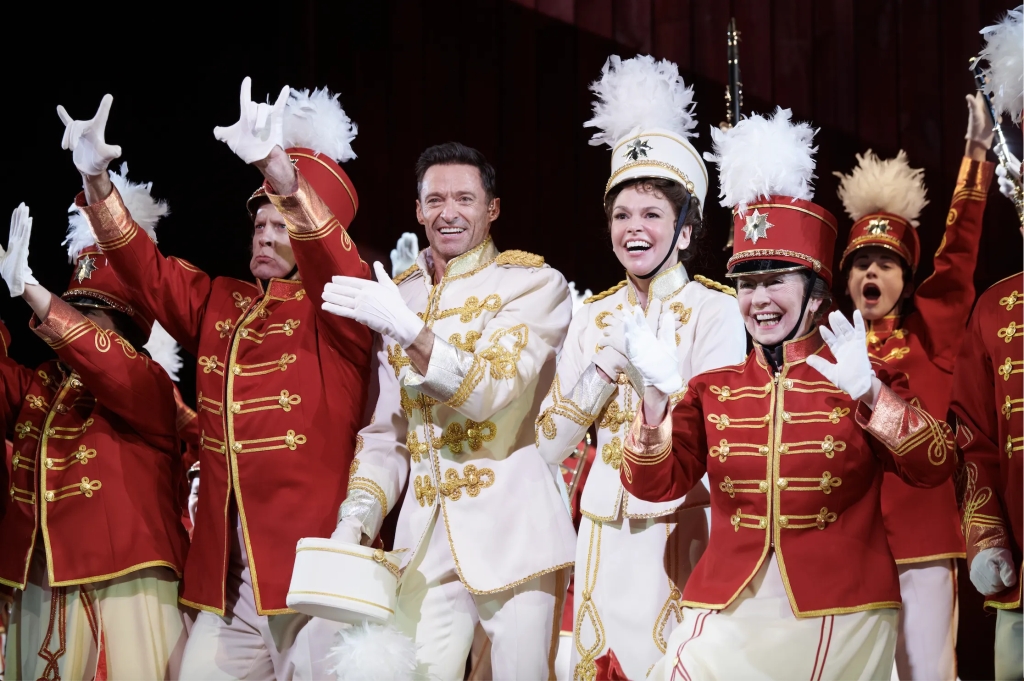
. . . or why some critics have rocks in their heads.
This past Saturday I had the extreme pleasure of seeing the current revival of “The Music Man” on Broadway, starring Hugh Jackman and Sutton Foster. When this show opened a few weeks ago the critics weren’t kind, to say the least. In no particular order, they carped at the number and length of the dance sequences, Hugh Jackman’s portrayal of Harold Hill, Sutton Foster’s not being a soprano, the politically-corrected lyrics in our MeToo age (rest assured, though, Professor Hill is still rooting for Hester to win just one more “A”) and the plain-looking sets, among other things. Before I start telling you why they’re off the beam, I’ll give them one tiny benefit of the doubt—because of the nature of theater, they of course did not see the performance I saw, and it’s possible some directorial tweaking occurred after opening night. But by and large, as Eulalie Mackechnie Shinn would say, I think they’re a bunch of fuddy-duddies.
A bit of background: I adore “The Music Man.” It’s creator Meredith Willson’s loving tribute to his Iowa roots, and a wonderfully feel-good show in the best sense of the term. I was 10 when I first saw it, the first live adult theater I experienced. The star was Bert Parks (“Here she is, Miss America…”), and while his brash personality was a great fit for the show, “The Music Man’ works just as well in a somewhat more intimate mode. Three years ago I saw a revival at the Goodspeed Opera House in Connecticut, that gem of Victorian architecture, and though scaled to fit the house, the piece lost none of its charm. The story of a con man turned romantic hero plays so well that it will always entertain.
While the current revival is not without fault, there is so much to enjoy. Hugh Jackman’s take on Harold Hill is somewhat different than that of Robert Preston, who created the role. There’s a welcome slyness to him at the start, and he charms us into the con without putting down the good folks of River City. He’s exceptionally warm with Mrs. Paroo and the kids he wants in the band, especially Winthrop, Marian Paroo’s tongue-tied younger brother, and his falling for Marian is remarkably genuine. Most of all, I marveled at Hugh Jackman’s energy. He dances full out in all the ensemble numbers, and it’s somewhat incredible that he can do this eight times a week (and twice on matinee days!).
Marian Paroo is a classic soprano role, originally played on Broadway by Barbara Cook, and later by Rebecca Luker, among others. I had my reservations when I learned Sutton Foster had been cast in the role, primarily because she’s known as a belter, many degrees away from Marian’s high vocal lines. As a result Ms. Foster is now singing several steps above her natural range, even though the keys of her songs have been lowered, if my ear is to be trusted. Similarly I’m fairly certain that the keys were raised for Hugh Jackman, since he’s a tenor. This may explain why the two of them don’t perform the duet portion of “Till There Was You.” However, Ms. Foster sings this song beautifully, with phrasing, tempo and emotion beyond reproach. No wonder Harold Hill is smitten.
What I most admired about her performance, though, was the sense of humor she brought to the character she played. Marian Paroo usually starts off as a bit of a pill, but not in Ms. Foster’s version. Her exchanges with her mother and with Amaryllis, her piano student, crackle, and her vamping of Charlie Cowell, the anvil salesman out to expose Harold Hill as a fake, is terrific satire. As a result, her Marian’s no ingenue, no “dewy young miss who keeps insisting” as in “The Sadder But Wiser Girl.” To the contrary—she’s definitely “a lady who knows what time it is.”
The musical highlight of the show for me has always been “Lida Rose/Will I Ever Tell You.” This revival features a fine foursome for the River City school board members turned barbershop quartet. All are in terrific voice, especially the bass. Although the tempo for “Lida Rose” was a bit brisk, the quartet’s dynamics were perfect. As I’ve noted before, this is where the show invites us to savor a warm summer night in pre-World War I America, and I would have liked to have lingered just a bit longer. On the other hand, I enjoyed the show’s new orchestrations, which some critics carped about. Jonathan Tunick, one of Broadway’s best orchestrators, composed these, and I loved the touches of ragtime he added, which after all rightly reflect the era. As another example of critics’ sometimes non-existent frame of reference, not one mentioned that this production’s backdrops of Iowa fields and small town Main Street are totally in the style of painter Grant Wood, a son of that state. They added a lot to the flavor of the production, as did the appearance of the Wells Fargo wagon. How they could miss that is beyond me.
Until “The Music Man” it had been two years since I had seen a show on Broadway. What a wonderful way to break the COVID drought. Go see it!

